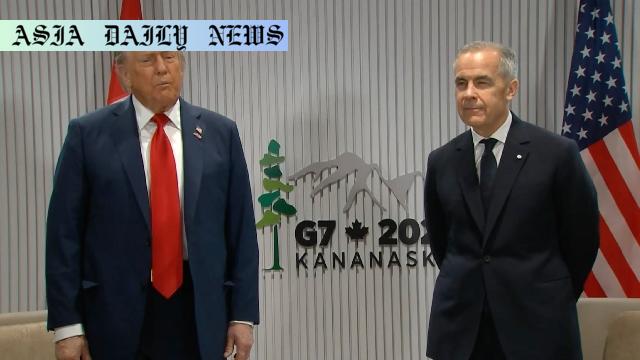Trump will return to Washington early from the G7 summit in Canada, citing escalating issues in the Middle East.
- US President Trump will leave the G7 summit early.
- The decision is attributed to escalating Middle East tensions.
- White House Press Secretary confirms the sudden departure.

Introduction: President Trump Exits G7 Summit Early
US President Donald Trump has made headlines once again with a bold and unexpected move: departing early from the Group of Seven (G7) summit in Canada. The decision, announced by White House Press Secretary Karoline Leavitt, was reportedly due to escalating unrest and critical developments in the Middle East. This decision highlights the administration’s approach of prioritizing immediate international challenges over multilateral engagements that traditionally dominate such summits.
The G7 summit, which gathers leaders from the world’s leading economies to address significant global issues, serves as a key platform for collaboration and consensus-building. Trump’s early leave raises questions about both the state of Middle Eastern affairs and the potential implications for US foreign policy. As global dynamics become increasingly complex, the president’s move underscores the urgency his administration places on addressing these rising tensions.
Focus Shifts from Multilateralism to Regional Crisis
The Middle East continues to present pressing challenges, encompassing ongoing political upheaval, regional conflicts, and potential threats to global security. By cutting short his attendance at the G7 summit—an event that prioritizes global collective action—President Trump is sending a message about America’s engagement strategy. The decision reflects the administration’s belief that resolving imminent crises requires concentrated action and leadership at home, rather than extended diplomatic discussions abroad.
Experts have speculated about the specific flashpoints that may have motivated this sudden move, with Iran, Syria, and Israeli-Palestinian relations likely playing central roles. This decision could signal a recalibration of priorities for the US, shifting emphasis toward the Middle East as a centerpiece of the administration’s foreign policy agenda.
Implications for Washington’s Relationship with the G7
Trump’s early departure from the G7 raises critical questions about US commitment to multilateral platforms. While the administration has often emphasized “America First” priorities, this choice might exacerbate tensions with allies who rely on US leadership in shaping global responses to challenges like trade policy, climate change, and security threats. A move like this can be seen in two ways: either as an act of leadership focusing resources on pressing crises or as a potential step back from global collective leadership responsibilities.
Nonetheless, this decision could also reinforce the importance of addressing immediate concerns in regions like the Middle East. Increased attention on events there may pave the way for a more proactive, targeted form of diplomacy. However, it remains vital to balance this focus with long-term commitments to alliances and global stability.
Conclusion: Balancing Priorities Amidst Global Challenges
President Trump’s decision to leave the G7 summit early encapsulates the complexities faced by modern leaders balancing domestic, international, and multilateral priorities. Although this choice places emphasis on the Middle East, it also underscores debates over unilateral action versus collaborative engagement. As rising tensions in volatile regions demand attention, the administration’s approach will be a closely watched indicator of its strategies in navigating shifting geopolitical landscapes.



Commentary
Reflections on Trump’s Prioritization of the Middle East
President Trump’s decision to depart early from the G7 summit in Canada signals a deliberate prioritization of critical developments in the Middle East over multilateral engagements. This decision reveals the administration’s belief in the importance of addressing urgent concerns head-on. While the move may highlight strong leadership and decisive action, it also poses questions about America’s sustained commitment to global platforms like the G7, which rely heavily on US leadership.
Balancing Domestic and International Responsibilities
Leaders often face the challenge of balancing multilateral commitments with immediate crisis management. Trump’s departure illustrates how crises such as unfolding tensions in the Middle East can realign a leader’s focus. While understandable, the choice also draws attention to the broader implications of stepping away from significant platforms designed to encourage global cooperation and consensus-building. Critics might view this as a missed opportunity for the US to demonstrate its commitment to shared international goals.
Looking Ahead: Policy Shifts and Global Repercussions
As the US focuses on the Middle East, the central question remains: will this recalibration of priorities yield tangible results? While the region demands care and concentrated effort, disengaging from global platforms like the G7 could risk alienating allies and undermining US influence. It will be crucial to monitor how this decision shapes both short-term diplomacy in the Middle East and long-term relations with allies.
Ultimately, President Trump’s early exit from the G7 summit is a bold move that underscores his administration’s preference for decisive, immediate action over prolonged multilateral processes. While this approach has its strengths, it demands careful execution to ensure it doesn’t end up straining relationships outside the Middle East.